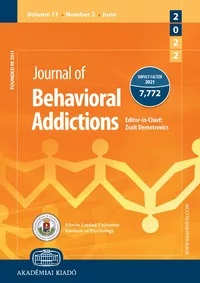Examining the reliability of the scores of self-report instruments assessing problematic exercise: A systematic review and meta-analysis
Examining the reliability of the scores of self-report instruments assessing problematic exercise: A systematic review and meta-analysis
Author(s): Manuel Alcaraz-Ibáñez, Adrian Paterna, Álvaro Sicilia, Mark D. GriffithsSubject(s): Behaviorism
Published by: Akadémiai Kiadó
Keywords: internal consistency; alpha; psychometric properties; morbid exercise; exercise dependence
Summary/Abstract: Background and aims. Problematic exercise (PE) has mainly been assessed with self-report instruments. However, summarized evidence on the reliability of the scores derived from such instruments has yet to be provided. The present study reports a reliability generalization meta-analysis of six well-known self-report measures of PE (Commitment to Exercise Scale, Compulsive Exercise Test, Exercise Addiction Inventory, Exercise Dependence Questionnaire, Exercise Dependence Scale, and Obligatory Exercise Questionnaire). Methods. Pooled effect sizes were computed using a random-effect model employing a restricted maximum likelihood estimation method. Univariable and multivariable meta-regressions analyses were employed for testing moderator variables. Results. Data retrieved from 255 studies (741 independent samples, N = 254,174) identified three main groups of findings: (i) pooled alpha values that, ranging from 0.768 to 0.930 for global scores and from 0.615 to 0.907 for subscale scores, were found to be sensitive to sociodemographic and methodological characteristics; (ii) reliability induction rates of 47.58%; and (iii) the virtually non-existent testing of the assumptions required for the proper applicability of alpha. Data unavailability prevented the provision of summarized reliability estimates in terms of temporal stability. Discussion. These findings highlight the need to improve reliability reporting of the scores of self-reported instruments of PE in primary studies. This implies providing both prior justification for the appropriateness of the index employed and reliability data for all the subpopulation of interest. The values presented could be used as a reference both for comparisons with those obtained in future primary studies and for correcting measurement-related artefacts in quantitative meta-analytic research concerning PE.
Journal: Journal of Behavioral Addictions
- Issue Year: 11/2022
- Issue No: 2
- Page Range: 326-347
- Page Count: 22
- Language: English

